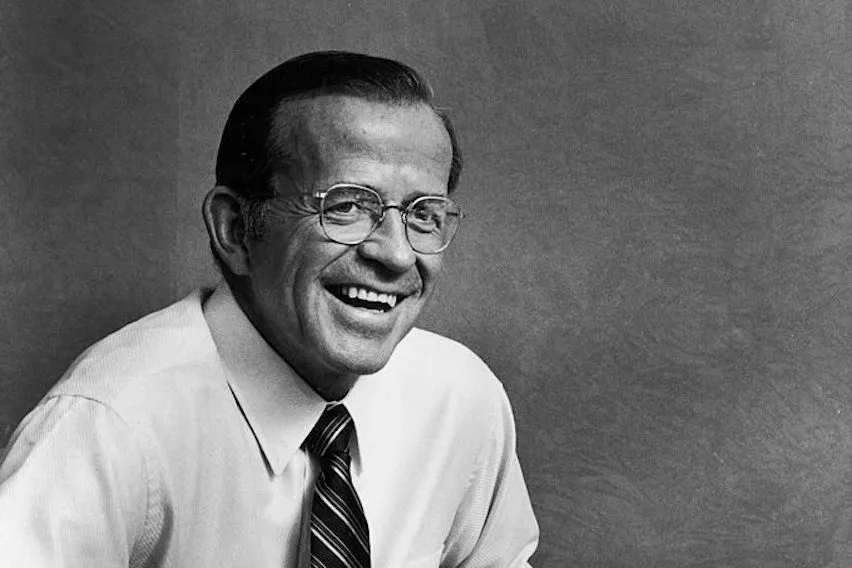Learn from what Dee Hock, founder and former CEO of Visa, has to say about relationship priorities for managers.

I was recently introduced to the writings of Dee Hock, founder and former CEO of Visa. Here is what he has to say about relationship priorities for managers:
Dee Hock on Leadership
“I ask each person to describe the single most important responsibility of any manager. The incredibly diverse responses always have one thing in common: All are downward looking.
“Management inevitably has to do with exercise of authority—with selecting employees, motivating them, training them, appraising them, organizing them, directing them, controlling them. That perception is mistaken.
The Importance of Managing Oneself
“The first and paramount responsibility of anyone who purports to manage is to manage self, one’s own integrity, character, ethics, knowledge, wisdom, temperament, words and acts. It is a complex, never-ending, incredibly difficult, oft-shunned task.
“Management of self is something at which we spend little time and rarely excel precisely because it is so much more difficult than prescribing and controlling the behavior of others.
“Without management of self, no one is fit for authority, no matter how much they acquire. The more authority they acquire the more dangerous they become. It is the management of self that should have half of our time and the best of our ability. And when we do, the ethical, moral and spiritual elements of managing self are inescapable.
The Importance of Managing Up
“Asked to identify the second responsibility of any manager, again people produce a bewildering variety of opinions, again downward-looking. Another mistake. The second responsibility is to manage those who have authority over us: Bosses, supervisors, directors, regulators, ad infinitum.
“In an organized world, there are always people with authority over us. Without their consent and support, how can we follow conviction, exercise judgment, use creative ability, achieve constructive results or create conditions by which others can do the same? Managing superiors is essential. Devoting a quarter of our time and ability to that effort is not too much.
The Importance of Managing One’s Peers
“Asked for the third responsibility, people become a bit uneasy and uncertain. Yet, their thoughts remain on subordinates. Mistaken again. The third responsibility is to manage one’s peers—those over whom we have no authority and who have no authority over us—associates, competitors, suppliers, customers—the entire environment, if you will.
“Without their support, respect and confidence, little or nothing can be accomplished. Peers can make a small heaven or hell of our life. Is it not wise to devote at least a fifth of our time, energy and ingenuity to managing peers?
The Importance of Hiring ‘Decent People’ and Enjoying the Process
“Asked for the fourth responsibility, people have difficulty coming up with an answer, for they are now troubled by thinking downward. However, if one has attended to self, superiors and peers, there is little else left. The fourth responsibility is to manage those over whom we have authority.
“The common response is that all one’s time will be consumed managing self, superiors and peers. There will be no time to manage subordinates. Exactly! One need only select decent people, introduce them to the concept, induce them to practice it and enjoy the process.
“If those over whom we have authority properly manage themselves, manage us, manage their peers and replicate the process with those they employ, what is there to do but see they are properly recognized, rewarded and stay out of their way?
“It is not making better people of others that management is about. It’s about making a better person of self. Income, power and titles have nothing to do with that.”
My Two Cents
I could not agree more. Certainly, focus and priority are paramount for everyone in an organization, and Dee’s insights are a great guide should you ever lose your way.

Written by Mike McDerment, Chair of the Board and Co-Founder, FreshBooks
Posted on June 11, 2008
 Growing Your Team? Here Are the Hiring Costs to Consider
Growing Your Team? Here Are the Hiring Costs to Consider Beware of Clones and Unicorns: How to Build a Winning Team
Beware of Clones and Unicorns: How to Build a Winning Team 5 Steps to an Award-Winning Culture
5 Steps to an Award-Winning Culture





